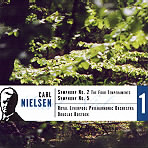The Royal Liverpool Philharmonic has made some outstanding recordings under Sir Charles Mackerras and Libor Pesek. Douglas Bostock is not a conductor of the same rank. He directs lively but not outstanding performances of both symphonies, with the Second coming off particularly well, even though it lacks the snap that Blomstedt (Decca) and Chung (BIS) bring to the piece. But he lets the Fifth Symphony’s first movement die by allowing the solo snare drum to wimp out in its improvised cadenza. Nielsen was quite clear in his intentions: the player must slam into his drum “as if he wishes to stop the progress of the orchestra at all costs.” Bostock’s player gets drowned out before he’s halfway through the passage in question. The second movement reveals the Liverpool strings pushed to the limit of their endurance, and the low level recording doesn’t really provide enough solidity at the bottom end of the sonic spectrum. Bostock also seems at a loss in the first, wild fugue; with mushy timpani and some shaky ensemble playing, it’s a scramble of the wrong sort. The best snare drum cadenza ever is on Horenstein’s recording (Unicorn), but that performance gets let down by mediocre brass playing from the New Philharmonia and by Horenstein’s own sluggish tempo in the second movement. Probably the best all-around version of the Fifth remains Bernstein’s (Sony), or Rozhdestvensky’s surprisingly energized, excitingly played reading on Chandos, a sleeper if ever there was one. The fact that Bostock plays the new critical editions is irrelevant, given the value of the performances themselves. Dacapo’s new Nielsen cycle, using these same new editions, sounds far more promising.
































